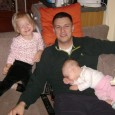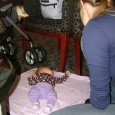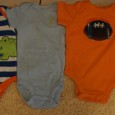There are many theories on human and child development which were developed after years and years of research and studying. I have my own theory on the phases and stages children go through as they grow. Mine is in no way scientific but based purely on my own observations of the many young children I’ve cared for over the years. So here it is, the Roy Stages of Young Children’s Behavioral Development:

 The Newbie (approx. birth to 6 months): This stage includes all babies fresh out of the belly. Newbies tend to be very needy, spending the majority of their time eating, sleeping, peeing, pooping, and yes, crying or fussing. At the beginning of this stage the newbie doesn’t do much (other than the before mentioned) but as they near the end of this stage, they begin exploring their world and developing the ability to entertain themselves. During this stage the child goes through periods of extreme happiness and extreme fussiness, sometimes both within minutes.
The Newbie (approx. birth to 6 months): This stage includes all babies fresh out of the belly. Newbies tend to be very needy, spending the majority of their time eating, sleeping, peeing, pooping, and yes, crying or fussing. At the beginning of this stage the newbie doesn’t do much (other than the before mentioned) but as they near the end of this stage, they begin exploring their world and developing the ability to entertain themselves. During this stage the child goes through periods of extreme happiness and extreme fussiness, sometimes both within minutes.
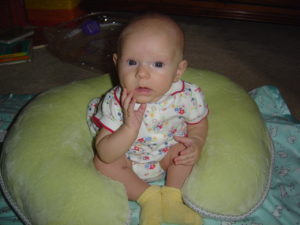 The Sitter (approx. 6 to 10 months): During this stage the child is able to sit unassisted but is not yet mobile. While the child at this stage still spends a lot of time sleeping, eating, pooping and peeing, At this point the child usually becomes much happier as they are now able to better entertain themselves through the regular use of both hands. They spend a lot of time building their fine motor skills as they play and usually begin self-feeding and require less constant attention.
The Sitter (approx. 6 to 10 months): During this stage the child is able to sit unassisted but is not yet mobile. While the child at this stage still spends a lot of time sleeping, eating, pooping and peeing, At this point the child usually becomes much happier as they are now able to better entertain themselves through the regular use of both hands. They spend a lot of time building their fine motor skills as they play and usually begin self-feeding and require less constant attention.
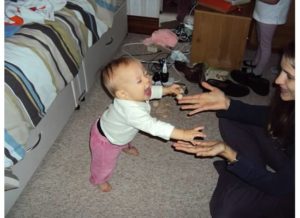 The Mover (approx. 10 to 15 months): This stage includes the time when a child learns to scoot, crawl, climb, walk and run. The child will still spend a majority of its time eating, sleeping, pooping and peeing and may have times or renewed fussiness as they develop these important and tiring new gross motor skills. During this stage the child will continue exploring his/her environment by getting into anything and everything they can and will once again require a lot of attention to ensure their safety.
The Mover (approx. 10 to 15 months): This stage includes the time when a child learns to scoot, crawl, climb, walk and run. The child will still spend a majority of its time eating, sleeping, pooping and peeing and may have times or renewed fussiness as they develop these important and tiring new gross motor skills. During this stage the child will continue exploring his/her environment by getting into anything and everything they can and will once again require a lot of attention to ensure their safety.
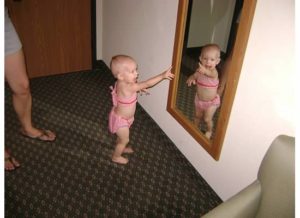 The Talker (approx. 15 months to 2 years): During this stage the child starts to communicate his/her needs in verbal and/or non-verbal ways which might include using gesturing, taught sign language, whining or screaming. They become more independent as they are better able to engage is self-help tasks like eating. The child learns they can more easily communicate their needs and may become happier when their needs are readily met or more frustrated when they learn they will not get everything they want when they want (or both).
The Talker (approx. 15 months to 2 years): During this stage the child starts to communicate his/her needs in verbal and/or non-verbal ways which might include using gesturing, taught sign language, whining or screaming. They become more independent as they are better able to engage is self-help tasks like eating. The child learns they can more easily communicate their needs and may become happier when their needs are readily met or more frustrated when they learn they will not get everything they want when they want (or both).
 The Helper (approx. 2 years to 2 ½ years): The child in this stage is extremely helpful. They enjoy trying new things and are eager to assist with most any task when asked. They continue to become more independent in completing self-help tasks such as eating, drinking and communicating toileting related needs. Children are usually very happy during this stage as they are so centered on the happiness of those around them.
The Helper (approx. 2 years to 2 ½ years): The child in this stage is extremely helpful. They enjoy trying new things and are eager to assist with most any task when asked. They continue to become more independent in completing self-help tasks such as eating, drinking and communicating toileting related needs. Children are usually very happy during this stage as they are so centered on the happiness of those around them.
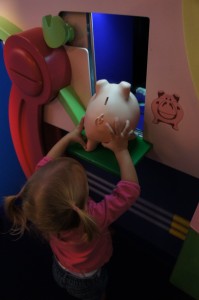 The Aloner (approx. 2 ½ to 3 years): At this stage the child no longer aims to please their caregivers but would rather do things their way on their schedule and are no longer really helpful nor do they want help. They are very ego-centric, wanting things done their way and on their schedule. Though at this stage children also usually become better at entertaining themselves, often wandering off on their own to play (just beware of the quiet, usually it means they’re up to no good!) During this stage is when most children potty-train and can become very demanding, bossy and sometimes no fun to be around.
The Aloner (approx. 2 ½ to 3 years): At this stage the child no longer aims to please their caregivers but would rather do things their way on their schedule and are no longer really helpful nor do they want help. They are very ego-centric, wanting things done their way and on their schedule. Though at this stage children also usually become better at entertaining themselves, often wandering off on their own to play (just beware of the quiet, usually it means they’re up to no good!) During this stage is when most children potty-train and can become very demanding, bossy and sometimes no fun to be around.
The Dictator (approx. 3 to 4 years): During this stage, the child continues to build their independence. They continue wanting things done their way and believe they are king/queen of the universe. They begin bossing others around, expecting everyone to do what they want. This can be a frustrating time for the child as they learn they, in fact, are not in charge of the world and are regularly shut down by the real dictator (i.e. Mommy).
The Know-It-All (approx. 4 to 5 years): This is when children often start pre-school and being really absorbing large amounts of information. This new skill of learning often makes the child feel like they already know everything and others around them know nothing. They listen to everything and believe everything they hear. They process what they see or hear within the context of their previous experiences and may come to misinformed conclusions and it can be hard to convince the child of the truth as they live with very black/white opinions. During this stage the child is very curious but can also be extremely argumentative
I don’t have enough experience to classify children past 5 years as Honeybun is just reaching this stage and I never worked intensively with children older than 5 though if Honeybun’s trend continues 5 to 6 years may be “The Pleaser” as she is starting to revert back to tendencies of “The Helper” and is working very hard to please and gets very upset when we are upset with her.


